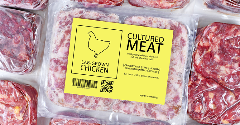News
Protein diversification: A massive missed market?
20 Feb 2025Germany and the UK could be missing out on the massive market for alternative meats and proteins, with one new coalition calling for an end to the “steak-tofu struggle”.

The coalition, which is made up of companies and non-governmental organisations (NGOs), as well as an “unusual coalition” of members of the European Parliament (MEPs), is behind one of two separate reports published this month on the topic. It is also calling for an end to the protein polarisation that dominates dialogue over sustainable diets and the shift to alternative protein sources.
“We’re not asking anyone to pick sides in a food fight,” said Marin Vandamme, part of the SustainableFoundations coalition, which includes brands like Oatly, Nestlé, Nova Meat, Impossible and Danone. “Instead, we’re urging the [European] Commission to include sustainable protein diversification in their vision for a food system.”
The European Commission is expected to deliver more details on this vision later this month. The opportunities from plant-based foods are handsome, but are Europe and its member states in danger of letting them slip through their fingers?
Alt proteins in Germany worth €65 billion
Plant-based, fermentation-made, and cultivated foods could boost the German economy by €65 billion and 250,000 new jobs over the next two decades, reported Systemiq, a systems change company, and non-profit think tank the Good Food Institute (GFI).
Greenhouse gas emissions could also be reduced by up to 4.8 million tons of CO2e, while freshwater consumption and land use requirements could be cut by 76 million m3 and 1.2 million ha respectively, as the alt protein market grows to be worth €23 billion by 2045.
However, if policy support and investment is found wanting and it is business as usual, the economic and environmental benefits shrink dramatically, according to the forecasts.
Growth in plant-based foods would remain relatively healthy to 2030 at 9.7% per year (slower than the 17% over the past five years but better than the 8% in 2022-23). However, they would then “stagnate” as they reached their “performance ceiling”, while meat and dairy consumption grows. By 2045, the alternative protein market might only reach €8 billion.
“Such stagnation would erode Germany’s market share and hinder its ability to compete globally,” GFI and Systemiq warned, as they described the current alt protein market in the country as “fragile” in the report. “Policymakers should invest an average of €260 million per year in research and infrastructure and provide support for a solid, reliable path to the market,” they wrote.
UK: Alt protein policies progress but not at pace
There were similar warnings for the UK, as a GFI analysis showed “positive but slow progress” in “modernising regulations” for foods such as cultivated meat and precision fermentation.
The UK government has invested £75 million (€90 million) in developing sustainable new foods – more than half the amount (£125 million, or €150 million) recommended by a landmark review of England’s food system in 2021. This represents a “solid foundation” on which to build a “thriving alternative protein sector” in the country, said GFI Europe’s senior UK policy manager, Linus Pardoe. However, the job is “only half done”, he added.
The Labour government’s new strategy, which will be published in the first half of this year, offers what GFI refers to as a “unique opportunity to boost food security, drive green growth and create new opportunities for food producers by accelerating protein diversification”.
GFI Europe praised the creation of four major new UK research centres, backed by public and philanthropic investment. However, it would be “premature” to call the Cellular Agriculture Manufacturing Hub, the National Alternative Protein Innovation Centre, the Microbial Food Hub, and the Bezos Centre for Sustainable Proteins the kind of “cluster” for startups and scientists envisaged in the 2021 strategy.
The UK is now the second-largest public research funder in this field in Europe (after Denmark).
Speaking at the Sustainable Food Conference in London in January, experts from the sector highlighted the uncertain regulatory and changing consumer environments. The risks of investment in downstream processing are currently “quite large”, noted Sarah O’Neill, global strategy director at Carbery Group, a manufacturer of specialty and nutritional dairy ingredients based in Ireland. Our biggest challenge is scaling up these products, she added.
Companies seek approval assistance for novel foods
For those involved in cultivated meats, it is the regulatory landscape that needs addressing.
At the EU level, approval sits within the novel foods regime – a process involving a thorough and evidence-based assessment of the safety and nutritional value of the product, conducted by the European Food Safety Authority (EFSA). This is then reviewed by the European Commission in consultation with member states.
Companies say this system delivers the trust that consumers want, and have become accustomed to, but targeted support from member states would help them file “high-quality applications” for cultivated meats and products made by precision fermentation. GFI and Systemiq noted continual delays caused by businesses submitting substandard dossiers to food safety authorities.
UK regulators are not helping either, suggested GFI. The Food Standards Agency (FSA) has published a specific webpage for cultivated meat, but this only links to generic advice, such as EFSA’s novel foods guidance, GFI noted in its UK analysis.
The FSA’s cultivated meat regulatory sandbox has committed to publishing more detailed guidance, but “it is difficult to see this being published until late 2025 at the earliest and it will only be relevant for cultivated meat producers”. There is no specific regulatory guidance for other alt proteins, such as precision fermentation-made ingredients and proteins, fungi-based proteins, and novel plant proteins.
The UK also lacks a modern approach to safe, limited taste testing, added GFI. The Netherlands has managed to produce a protocol for such tests that is workable within the novel food regulations. And this month Iceland became the first location outside Asia to hold a tasting of cultivated shellfish.
“In the era of responding to climate change, for cell-cultured foods to become widely adopted by the public, they must not only excel in fundamental aspects like taste but also provide economic efficiency and environmental value,” said Giljun Park, CEO and founder of Cellmeat, the South Korean producer of cultivated foods that hosted the event with ORF Genetics, a plant biotech company based in Iceland.
Calls for ceasefire in cultivated clash
Cultivated meats are controversial. In Europe, some countries want the technology banned, with France, Greece, Hungary, and Italy citing dangers such as the potential monopolisation of food production and erosion of the traditional farming model. They have also questioned the touted environmental benefits of the products. Plant-based meats have also come under fire for the level of processing involved.
This has created what Euractiv referred to as the “steak-tofu rift”. However, the position paper published in early February by the SustainableFoundations coalition has garnered support from MEPs on the left and right.
“Protein diversification is not about choosing tofu over steak,” explained Vandamme, from the School for Moral Ambition in The Netherlands and part of the coalition. “It’s about options, balance, and innovation – from regenerative grazing to better plant-based proteins, to precision fermentation and new business models for farmers. We need to rise above the polarisation and embrace practical, win-win solutions for the future of food in Europe.”
Related news

Future F&B flavours favour exploration and explosive taste profiles
25 Mar 2025
Exploration and experimentation will define the future of flavour, according to Mintel, as consumers seek out taste profiles and textures that offer an adventurous eating experience.
Read more
Partnership plans to scale cultivated meat production
21 Mar 2025
Food technology innovator Ever After Foods (EAF) and multinational food leader Bühler are striving to overcome hurdles to access and accelerate the development of cultivated meat.
Read more
Global consumers enjoy food less and perceive it as less healthy
20 Mar 2025
Enjoyment of food and its perceived healthiness is dwindling among most global populations, according to findings from Gallup and Ando Foundation/Nissin Food Products.
Read more
Seafood set to ‘dethrone’ poultry as protein growth king
19 Mar 2025
Seafood is poised to surpass poultry as the leading contributor to global protein supply growth this year, according to Rabobank’s latest protein outlook.
Read more
Tariff volatility leaves food manufacturers in limbo
11 Mar 2025
Rapid US trade policy shifts and tariff escalations are creating uncertainty for food manufacturers and ingredient suppliers.
Read more
F&B industry hit with fresh greenwashing claims
26 Feb 2025
The food and beverage (F&B) industry is under fresh scrutiny amid claims of greenwashing, with Arla the latest company in the firing line.
Read more
Have scientists discovered a new tool to measure UPFs?
19 Feb 2025
Researchers have developed a new scoring system and database, compiling over 50,000 food items, of which over 1,000 are classified as ultra-processed.
Read more
China ramps up cultivated meat research with new innovation base
18 Feb 2025
China has opened its first fermentation and cultivated meat research centre in Beijing.
Read more
Most consumers lack trust in AI, but supplement users are ready to embrace the technology
14 Feb 2025
A survey of UK and US consumers found that most supplement users are willing to let AI make decisions on their behalf, but they also demand greater transparency.
Read more
Indians enjoy first bites of cultivated chicken
13 Feb 2025
The first public tasting of cultivated meat in India has taken place as the country prepares for the first commercial cultivated meat products – potentially as early as the end of this year.
Read more